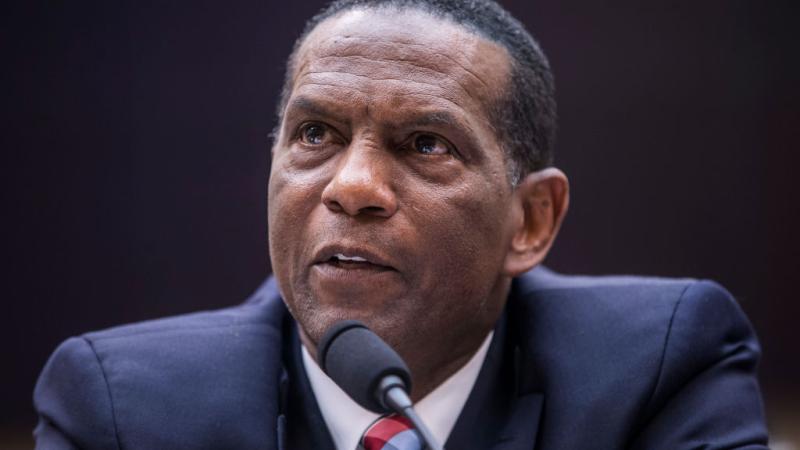Blue cities bleeding: Homicide rates surging in major cities run by Soros-backed DAs
Less than three weeks before Election Day, a new study shows killings are on the rise, while polling indicates crime remains a top issue for voters.
As polling continues to show crime is a top issue for voters, the number of homicides has skyrocketed nationwide.
In fact, homicide rates rose by an average of nearly 10% in 50 of the most populated U.S. cities between the third quarter of last year and the third quarter of this year — and are still rising — according to a new study.
WalletHub compared 50 of America's largest cities based on per capita homicides for the third quarter (July through September) of each year since 2020, using locally published crime data to compile its findings.
According to WalletHub, these were the ten cities with the highest homicide cases per 100,000 residents from July through September:
- St. Louis, Mo. (19.69)
- Kansas City, Mo. (14.86)
- Detroit, Mich. (13.24)
- Baltimore, Md. (12.45)
- New Orleans, La. (10.99)
- Milwaukee, Wisc. (10.46)
- Memphis, Tenn. (9.99)
- Philadelphia, Pa. (9.36)
- Norfolk, Va. (7.78)
- Chicago, Ill. (7.71)
The top prosecutors in most of these cities are backed by progressive megadonor George Soros, a billionaire who's spent the last several years injecting tens of millions of dollars into local district attorney races nationwide, backing candidates who support policies such as abolishing bail, defunding the police, and decriminalizing or deprioritizing certain offenses.
In St. Louis, for example, Circuit Attorney Kimberly Gardner is one of the first prosecutors bankrolled by Soros' financial network of organizations and affiliates, heavily funded by these sources in 2016 and again in 2020.
Amid high homicide figures, Gardner has declined more cases and issued fewer arrest warrants than her predecessor, charging fewer felonies and prosecuting thousands of fewer cases as a result. She has also deferred prison sentences for misdemeanors and nonviolent felonies as part of her reform initiatives.
Gardner has said this is part of her "platform to reduce the number of cases unnecessarily charged in order to focus on the more difficult cases for trial."
Last year, Gardner came under fire after three murder cases under her purview were dismissed in one week due to prosecutors in her office not showing up for hearings or being unprepared.
Her campaign website boasts that she's "made jail and prison a last resort, reserved for those who pose a true public safety risk," while limiting "the arrest and detention of people accused of misdemeanors and low-level felonies."
Philadelphia DA Larry Krasner is another Soros-funded prosecutor.
Soros spent almost $1.7 million through the Philadelphia Justice and Public Safety PAC to help Krasner in 2017, pouring more than five times as much money into the race as Krasner himself. Four years later, Krasner received a combined $1.259 million from Soros-funded groups for his reelection.
During his tenure, Krasner has cut the future years of incarceration by half and slashed the length of parole in probation supervision by nearly two-thirds compared to the previous DA. He has also made a priority of not prosecuting people who are illegally in possession of guns unless they hurt or kill people.
The top prosecutors in New Orleans, Milwaukee, Norfolk, and Chicago have also been backed by Soros-linked money. Many of the others are self-described progressive prosecutors.
According to some experts, progressive prosecutors pursuing soft-on-crime policies have contributed to the spike in homicides and other violent crime.
"Prosecutors in most major cities have failed the people they serve by refusing to prosecute criminals, including those charged with violent crimes," Tristin Kilgallon, associate professor of pre-law and history at the University of Findlay, told WalletHub. "Countless violent crimes have been committed by those who have been released back into the streets due to recent 'bail reform' initiatives or by prosecutors who declined to pursue charges."
However, a report released this summer by the Brennan Center for Justice at the New York University School of Law concluded there's insufficient evidence to establish a link between increased violence and progressive policies.
But Americans across the country feeling unnerved about the level of crime in their communities are seeing a link — and want to hold someone accountable.
"Prosecutors must stop putting politics before their duty to serve the public good," said Kilgallon. "The citizens must make these prosecutors aware that this is simply not acceptable. This is already happening in some places, like San Francisco, where we saw progressive District Attorney Chesa Boudin recalled."
San Francisco voters ousted Boudin from office in a recall focused on his soft-on-crime policies this summer. Crime had skyrocketed in the city as Boudin prosecuted significantly fewer felonies and misdemeanors than his predecessors. Boudin had said he wanted to abolish cash bail and end "mass incarceration."
San Francisco was one of many liberal hubs of the "defund the police movement" in 2020 that later did a virtual 180, embracing comparatively pro-police and tough-on-crime policies and rhetoric as crime devastated local communities.
"The crime surge pretty much killed the 'defund the police' narrative and reminded people of the importance of policing," Christopher Ferguson, professor of psychology at Stetson University, told WalletHub.
The policy remedies for the violent crime wave are widely understood, according to Ferguson. Less certain, he acknowledges, is whether there is sufficient political will to apply them.
"We already kind of know what needs to be done: more high-quality, responsive, accountable policing, better police training," he said, adding that "it is time to ditch 'defund the police' as well as the kind of progressive prosecuting that declines to press charges for wide [swaths] of crime."
Beyond this year, WalletHub also measured the change in 2022 third quarter homicide rates per capita compared to the third quarters of 2021 and 2020. A diverse group of cities experienced the biggest surges from last year to this year, such as Nashville, Tenn.; Colorado Springs, Colo.; and Raleigh, N.C.
Another city was Albuquerque, N.M., whose Democrat governor recently made headlines for pleading with the federal government for more law enforcement amid the current crime wave.
WalletHub used the homicide rates from all three years to determine "the weighted average across all metrics to calculate an overall score for each city." Nine of the 10 deadliest are run by Democratic mayors. (The office of mayor is nonpartisan in Norfolk). And all of the top 10 have liberal or progressive DAs, at least six of whom were funded by Soros.
- Kansas City, Mo.
- Detroit, Mich.
- St. Louis, Mo.
- New Orleans, La.
- Milwaukee, Wis.
- Albuquerque, N.M.
- Philadelphia, Pa.
- Norfolk, Va.
- Nashville, Tenn.
- Oakland, Calif.
Overall, the study found blue cities with Democrat mayors had a higher increase in homicide rates than red cities with Republican mayors. When comparing the biggest spikes in homicide cases per capita from the third quarter last year to the third quarter this year in America's 50 most populous cities, blue cities ranked on average 24.86, while red ones ranked on average 26.50.
In other words, GOP-led cities had slightly lower homicide spikes, according to the study.
In recent weeks, Republican candidates have been hammering Democrats with relentless attack ads for pushing policies that, they argue, contribute to increases in crime.
Several top Republicans, including former President Trump, have embraced this emphasis, which appears to be resonating, with GOP candidates gaining ground in several key races.
Polling has consistently shown for months that crime is a top issue for voters, that voters trust Republicans more than Democrats to handle it, and that a majority of voters disapprove of Biden's handling of crime.














